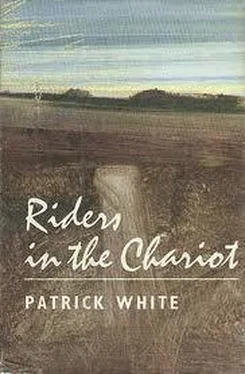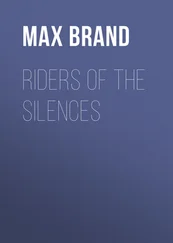Patrick White - Riders in the Chariot
Здесь есть возможность читать онлайн «Patrick White - Riders in the Chariot» весь текст электронной книги совершенно бесплатно (целиком полную версию без сокращений). В некоторых случаях можно слушать аудио, скачать через торрент в формате fb2 и присутствует краткое содержание. Год выпуска: 1961, Издательство: Spottiswoode, Жанр: Современная проза, на английском языке. Описание произведения, (предисловие) а так же отзывы посетителей доступны на портале библиотеки ЛибКат.
- Название:Riders in the Chariot
- Автор:
- Издательство:Spottiswoode
- Жанр:
- Год:1961
- ISBN:нет данных
- Рейтинг книги:4 / 5. Голосов: 1
-
Избранное:Добавить в избранное
- Отзывы:
-
Ваша оценка:
- 80
- 1
- 2
- 3
- 4
- 5
Riders in the Chariot: краткое содержание, описание и аннотация
Предлагаем к чтению аннотацию, описание, краткое содержание или предисловие (зависит от того, что написал сам автор книги «Riders in the Chariot»). Если вы не нашли необходимую информацию о книге — напишите в комментариях, мы постараемся отыскать её.
is one of the Nobel Prize winner's boldest books.
Riders in the Chariot — читать онлайн бесплатно полную книгу (весь текст) целиком
Ниже представлен текст книги, разбитый по страницам. Система сохранения места последней прочитанной страницы, позволяет с удобством читать онлайн бесплатно книгу «Riders in the Chariot», без необходимости каждый раз заново искать на чём Вы остановились. Поставьте закладку, и сможете в любой момент перейти на страницу, на которой закончили чтение.
Интервал:
Закладка:
In the past the Hares had always blamed the Urquhart Smiths, and the Urquhart Smiths, with equal determination, had blamed the Hares. But now there were not many of either to argue and discuss. If it had not been for Norbert Hare himself one might have expected normality from such an untainted, bourgeois stock, for Norbert was the son of old Mr Hare, the wine merchant at Wynyard, as everybody knew. The Urquhart Smiths, understandably, knew it better than anybody else, and, forgetting the Smiths in favour of the Urquharts, were always ready to remind their Eleanor who had married Norbert. Eleanor was of that branch of the family at Mumblejug, of whom Sir Dudley, it will be remembered, arrived in New South Wales during the last century to represent the Queen. Renowned for his silk hats and horsemanship, Sir Dudley was an exemplary man, as his descendants had continued to tell long after everybody else had forgotten. If his daughter Eleanor was less remindful than some of the collaterals, it was perhaps because of her discreet temper, her indifferent health, and certainly, her unorthodox marriage. Of four sisters, she was the only one to survive. All lovely, gracious girls, three were buried before they had been matched, under the gum trees, outside the little Gothic church which Sir Dudley had built at Mumblejug, not so much to exalt the spirit, as to perpetuate a materialist tradition. So solid, so lovely-old, so _English__, Sir Dudley's church seemed to proclaim the situation at Mumblejug as indestructible. And then Eleanor went and did that terrible thing, of marrying Norbert, the son of old Hare the wine merchant at Wynyard. People of account, quite unacquainted with the Urquhart Smiths, were shocked into sympathy with them. Eleanor, however, departed with her portion, and many lesser individuals laughed. It was not that anybody failed to respect old Mr Hare. Nobody suspected his fortune of being anything less than considerable; nor were the matrimonial expectations of nice people particularly sanguine in such a recent society, unless the arrival of some Honourable roused intemperate hopes. All considered, a girl might have done worse than catch a Hare, and if practical minds did not quickly and quietly accept Eleanor Urquhart Smith's choice, the fault lay with her husband. Who was original. Norbert Hare had never been given to half-measures. He did, or contemplated doing, things which nobody else would have thought of. He once rode a grey horse up the marble stairs at Xanadu, as far as the landing, it was said, where his mount took fright, and deposited a mound of glaring yellow on the runner. Although they were not always executed, Norbert was forever conceiving plans: for building a study at the top of a Chinese pagoda, or stable in the shape of a mosque, for breeding _escargots de Bourgogne__, or planting medlars, or printing poems-his own-on sheets of coloured silk, woven for that purpose on the property. The wine merchant's son had received an education which his own peculiar temperament ensured was of a spasmodic and eclectic kind. At one period he had considered writing a treatise on Catullus, until discovering he was out of patience with that poet. Norbert had, in fact, written quantities himself: epigrams, and metaphysical fragments, which he would read aloud to anybody he succeeded in cornering. The fragment, it appeared, possessed for him a greater distinction than the whole. There were all those pieces of marble he brought from Italy. He brought the mosaics for a bath, all nymphs, and vines, and a big, black, baleful goat. Two Italian artisans were imported purposely to fit the pieces together, after it had been promised they would receive a regular supply of _vino__. The Italians came and practised their art, and drank their wine, and one of them, it was never decided which, got an Irish girl with child. Norbert and Eleanor were absent a good deal, of course, in foreign parts, because it was the period when Australians of That Class-and Norbert was soon of That Class-were returning Home to show they were as good as anyone else. So the Hares had to go, nor could the discreet Eleanor prevent rumours trickling back: that Norbert had been involved in a duel while passing through Perugia, and that in London he had fallen down in public while under the influence of strong drink. It was all in character. But Norbert's grandest gesture, the one that caused people to suck their teeth, to gnash them, or to set them in a kind, sad smile, was the building of his folly at Sarsaparilla outside Sydney. His Pleasure Dome, he called it, his Xanadu, and recited the appropriate verses to lady guests as they strolled in their veils and the afternoon, inspecting the freshly laid foundations of porous yellow stone. Nothing exquisite can be created in a hurry, and Xanadu was no exception. It cost time and patience; everybody grew exhausted. But there it stood finally: golden, golden, in a frill or two of iron lace, beneath the dove-grey thatching of imported slates, its stables and bachelor quarters trailing out behind. So Norbert, son of old Mr Hare, the wine merchant at Wynyard, was vindicated at last, if only in his own sight. He liked to climb up through his house, and on reaching the top, with its little, actual dome of faintly amethyst glass, spend a private hour devouring the flesh of a cold fowl, skimming opening lines from obscure poets, or just staring out over his own property. Or beyond, it could have been-beyond the still manageable park which he had ordered to be planted, beyond even the grey, raggedy native scrub, for his eyes appeared momentarily appeased, and that end might not have been achieved, if anchorage in time and space had forced him to recognize the native cynicism of that same grey, raggedy scrub.
Читать дальшеИнтервал:
Закладка:
Похожие книги на «Riders in the Chariot»
Представляем Вашему вниманию похожие книги на «Riders in the Chariot» списком для выбора. Мы отобрали схожую по названию и смыслу литературу в надежде предоставить читателям больше вариантов отыскать новые, интересные, ещё непрочитанные произведения.
Обсуждение, отзывы о книге «Riders in the Chariot» и просто собственные мнения читателей. Оставьте ваши комментарии, напишите, что Вы думаете о произведении, его смысле или главных героях. Укажите что конкретно понравилось, а что нет, и почему Вы так считаете.












